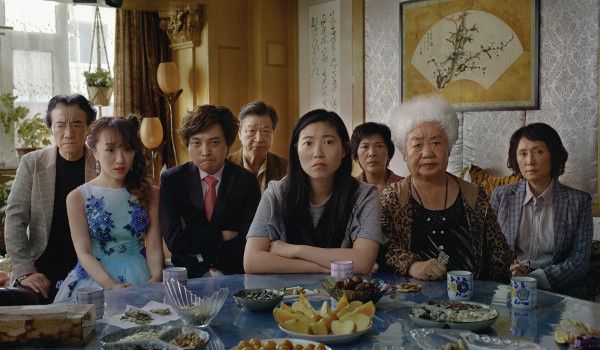Eye For Film >> Movies >> The Farewell (2019) Film Review
The Farewell
Reviewed by: Owen Van Spall

Written and directed by Lulu Wang, and based on an episode of the slice-of-life podcast series This American Life, The Farewell will inevitably be compared to the hit comedy Crazy Rich Asians, given it not only deals with the Asian diaspora experience but also features actress Awkwafina. She is in the lead role here however, and acquits herself well as a thirtysomething, New York-based struggling writer jumping awkwardly back into her Chinese family’s dramas back in the homeland. A somewhat slight piece that goes for gentle chuckles and observations rather than zaniness and epic confrontations, the cultural specificity of the emotional conflicts nevertheless offer up much interest and the film is well cast overall.
A unlikely as it sounds, in China it is apparently quite common for not only families but the medical establishment to collude to not tell elderly patients if they are diagnosed with a fatal disease or other condition, letting them spend the rest of their days in blissful ignorance while the wider family takes care of things behind the scenes.
Needless to say, having grown up in New York since she was nine following her Chinese parents' immigration and naturalisation, headstrong and emotional writer Billi (Awkwafina) is not convinced this is the ethically or medically correct way to approach the cancer diagnosis of her beloved Grandma ‘Nai Nai’. In the US, it would in fact be straight-up illegal. Nursing a bruised ego over failing to get a Guggenheim grant, Billi throws herself instead into a mission to confront her family over this plan for grandma’s last days, and rebels against her parents Jian (Diana Lin) and Haiyan’s (Tzi Ma) directive to stay in New York. Given the world-weary way Jian and Haiyan approach their daughter’s impulsive decision, its clear Billi - a product, after all, of two different cultures - has clashed with them before.
Maxing out her credit cards, Billi books a flight to join the family over in the built-up urban sprawl of Changchun, as they awkwardly attempt to rekindle old bonds, throw together a younger cousin’s wedding that it seems only grandma is actually looking forward to, and surreptitiously use the event to say their goodbyes. Awkwardness, tears, reconciliations, and some bad karaoke ensue. Alongside a dip in to the kind of urban environments that now dominate once-rural China, we are also privy to a lot of delicious eating too, with Billi’s China-based family very much one for letting food lubricate the workings of the day.
The Farewell can’t be mistaken for a deep dive into Chinese culture or the diaspora experience, and those expecting knocked-off-your-feet emotional catharsis and/or huge conflagrations of family ties won’t find that here. But Wang proves adept at slowly and gently building up the onion layers of this family as more and more of them come into each other’s orbit over meals, drinks and wedding logistics, and slowly but surely we see how this family works together; who are the effective tag-teams, who are carrying unresolved conflicts, and who are the square pegs in the round holes. The cast are all naturalistic in their chemistry with each other. Though the screenplay perhaps over-relies on her being a comedically crabby, bossy and anachronistic figure, actress Shuzhen Zhou as Nai Nai is the MVP of the piece, clearly enjoying one last chance to take creative control and flaunt her worldly experience. Her scenes with Awkwafina are genuinely moving.
Beyond the difficulty of translating one’s inherent assumptions over into another culture, what The Farewell’s screenplay also touches on effectively as it trundles gently along is how widely-established the phenomenon of family being fractured by globalisation has become. Like Crazy Rich Asians, this family has seen its members scattered over the globe, picking up bits and pieces of other cultures as they go, and they only reunite now for a key event, with Billi’s family being but one branch of the brood that made their way across the oceans to seek better job and educational opportunities.
Though Mandarin remains the main language spoken throughout the film, English and Japanese can be heard here and there, depending on which characters are conversing, varying abilities with languages and desires to keep things secret mean temporary micro-clans keep being formed within the larger family. The wedding itself involves Billi’s cousin marrying a Japanese girl, who for all her charm can clearly barely understand what is going on around her. This surely won’t be the last time an ‘outsider’ joins the family. And much of the conversation in the early days of the family’s gatherings consists of dwelling on how long it has been since they were all last at the dinner table together. A sadness thus permeates the proceedings, as not only is grandma not fated to live long, but it is likely this will be the last time all the family members will be in touching distance of each other for maybe decades, or at least until someone else kicks the bucket. The Farewell reminds us, sensitively, that the world has only got so small due to technology.
Reviewed on: 30 May 2019
















